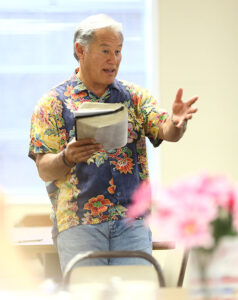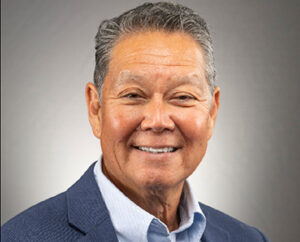Ministry leaders live, serve and are spiritually formed in an interconnected world. This digital age provides tremendous opportunities while simultaneously creating new unprecedented demands for leaders in both their work and personal lives.
Due to these hyper-demands of digital connection, coupled with an underdeveloped spiritual formation, many ministry leaders seek not only soul care but also a new way to structure formational ministry for the digital age.
 Dr. Wayne Cordeiro (’17), one of the Lead Mentors within the Master of Arts in Formational Leadership (MAFL) program at Lancaster Bible College | Capital Seminary & Graduate School, is the founding pastor of New Hope Christian Fellowship in Honolulu, Hawaii, a multi-site church with 23,000 members. Dr. Cordeiro, whose journey has included being expelled from seminary on his way to becoming a priest, attending business school and graduating from Bible college, was a guest on the Kingdom Collective Hawaii podcast to discuss the early days of New Hope, becoming an author, discerning God’s voice and more.
Dr. Wayne Cordeiro (’17), one of the Lead Mentors within the Master of Arts in Formational Leadership (MAFL) program at Lancaster Bible College | Capital Seminary & Graduate School, is the founding pastor of New Hope Christian Fellowship in Honolulu, Hawaii, a multi-site church with 23,000 members. Dr. Cordeiro, whose journey has included being expelled from seminary on his way to becoming a priest, attending business school and graduating from Bible college, was a guest on the Kingdom Collective Hawaii podcast to discuss the early days of New Hope, becoming an author, discerning God’s voice and more.
LISTEN & WATCH:
Dr. Wayne Cordeiro on Kingdom Collective Hawaii podcast
Students in LBC | Capital’s MAFL program have the opportunity to learn from some of the most influential church leaders in the country, as Cordeiro’s New Hope has been ranked as one of the top 10 most innovative churches in America by Outreach Magazine as well as one of the “top five churches to learn from.” With 40-plus years of ministry experience, Cordeiro has planted more than 150 churches planted in the United States and around the world and authored a dozen books, including “Leading on Empty,” “The Divine Mentor,” “Sifted” and “Doing Church as a Team.”
“Our gifts will take us only as far as our character will take us,” Cordeiro says. “At LBC | Capital, leadership is not defined by a title—it’s defined by our actions.”
 Coming alongside Cordeiro to serve students is Dr. Guy Higashi, a Lead Mentor counterpart within the Formational Leadership program. Formerly the president of New Hope Christian College and Pacific Rim Christian College, Higashi provides leadership to students online as well as during the residencies in Eugene, Ore., and Hawaii. He earned both a master’s and doctoral degree from Fuller Theological Seminary and also served the seminary as Director of Continuing Education.
Coming alongside Cordeiro to serve students is Dr. Guy Higashi, a Lead Mentor counterpart within the Formational Leadership program. Formerly the president of New Hope Christian College and Pacific Rim Christian College, Higashi provides leadership to students online as well as during the residencies in Eugene, Ore., and Hawaii. He earned both a master’s and doctoral degree from Fuller Theological Seminary and also served the seminary as Director of Continuing Education.
A former MAFL student named John can attest to the difficult road ministry leaders sometimes travel. Passionate, driven and well-suited for church planting, John not only pursued his dream but also realized it. He and his wife grew their young family, and life was good. But as the years passed, John found himself in a place of exhaustion. After four years of endless demands to a growing church, responding to an average of 200-plus emails and texts per day and living a life of unlimited digital demands, he was simply “done.” While attending a spiritual formation retreat, John shared with those in attendance about his brokenness: “My marriage is a mess, I have no time for my children, I model the same unhealthy patterns I tell church members not to live. There has to be another way!”
With ministry leaders exhausted and leaving the Church in significant numbers, it is imperative to evaluate the importance of spiritual formation in regards to the Church, its equipping models and how leaders are trained for healthy sustainable ministry in the digital age.
LBC | Capital’s MAFL program addresses these concerns and offers a holistic approach to leader development. The Master of Arts in Formational Leadership is an interconnected learning community designed to equip globally minded ministry leaders in self-care, digital communication, emotional intelligence, formative leadership principles, storytelling and global engagement. This 30-credit degree program seeks to transform individual leaders while setting a course for healthy influence within a global village. Special emphasis on interior development character formation, soul care and practical faith practices is central to the curriculum.
Enrolled ministry leaders are equipped to evaluate and care for their own soul as the basis for leading and participating in the mission of God in the global church and marketplace. The program journeys 10 online courses, three community formation residencies and personal interaction with key missional, formational and global leaders. Most students complete the course in 20 months, with residencies in Eugene, Ore., and Hawaii, plus the opportunity for an international travel experience.
Check out a few more key points about LBC | Capital’s Master of Arts in Formational Leadership:
- Lead from a position of deep interior development through loving your neighbor and participating in the grand narrative of God’s global mission.
- Taught by long-time pastors and Christian leaders, curriculum focuses on the soul development of the leader, resulting in a deeply formed leader skilled to live and serve in the digital age.
- Three words—virtue, character, ethics—will be imprinted on your mind and heart.
- A closed cohort model allows students and faculty to develop deep relationships throughout the program.
- Online courses enable you to stay fully engaged in your local ministry while studying with leaders from around the world.
Likewise, students can rest assured these MAFL program goals are top of mind throughout the program:
- Biblical Philosophy of Ministry. Students will formulate a philosophy of ministry respective to their community and culture, which is biblically founded, practical, missional and culturally sensitive.
- Global and Contextual Application. Students will generate a global understanding and praxis of relationship through strategic community formation residencies.
- Spiritual Health and Ministry Integrity. Students will cultivate a moral, ethical and spiritual foundation necessary for personal spiritual growth and sustainable ministry.
- Team Mentoring and Professional Experience. Students will build effective personal and professional relationships based on mutual support and accountability for the purpose of intentional ministry team development.
- Biblical Communication Skills. Students will formulate theological skill sets leading to an integration of the person, ministry and life of the leader for the purpose of communication.
- Ministry Leadership Skills. Students will develop leadership competencies for the purpose of influence in a digital culture.
Students also have the option to earn a Master of Divinity in Formational Leadership. Learn more about that program here.